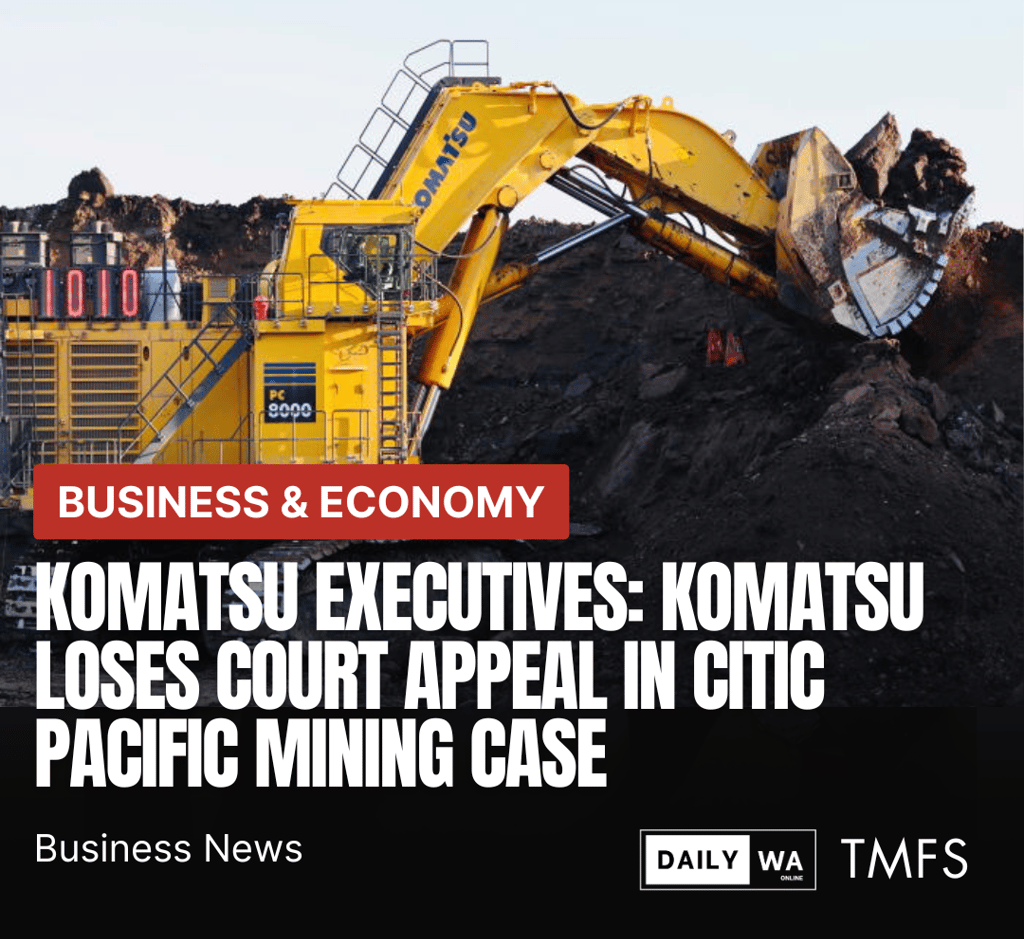Komatsu Loses Court Appeal in CITIC Pacific Mining Case: What It Means for WA’s Resources Sector
Komatsu’s failed court appeal against CITIC Pacific Mining highlights the growing legal and operational challenges in Western Australia’s resources sector, raising questions about contract security and business accountability.
BUSINESS & ECONOMY


In a case closely watched by industry insiders, Komatsu has lost its court appeal against CITIC Pacific Mining (CPM), marking a significant moment for Western Australia’s (WA) booming resources sector. The dispute, rooted in disagreements over contractual obligations and operational performance, reinforces the reality that even global industrial giants face major accountability hurdles when engaging with WA’s powerful mining operators.
Komatsu, a major supplier of heavy machinery and industrial equipment, had challenged earlier legal findings that sided with CITIC Pacific Mining, one of WA’s largest iron ore producers operating out of the Sino Iron project in the Pilbara. The court’s decision to uphold the ruling against Komatsu effectively cements CITIC’s legal standing while delivering a reputational blow to Komatsu’s Australian operations.
Why This Case Matters
WA’s resources industry is not only a central driver of the state economy but also deeply interconnected with international players in mining, engineering, and infrastructure. Legal disputes like this shine a light on the fragility of large-scale industrial agreements, particularly in an environment where multi-billion-dollar projects depend on precision, reliability, and strict contract adherence.
The judgment sends a message to suppliers and contractors: mining giants hold the upper hand in disputes, and courts are willing to back the operators if evidence of contractual shortcomings is strong. For companies like Komatsu, the case underscores the importance of risk management and robust compliance frameworks when dealing with resource sector clients who wield enormous influence.
Broader Implications for WA’s Business Climate
The decision also has ripple effects beyond the immediate parties. For WA businesses engaged in supply chains—whether in machinery, energy services, or construction—the ruling is a reminder that the courts will not hesitate to enforce accountability at the highest level. This may lead to stricter contract negotiations, tighter oversight, and possibly a reshaping of supplier relationships in the resources sector.
CITIC Pacific Mining, on the other hand, emerges with strengthened authority, bolstering its reputation as a dominant force in WA’s mining economy. For a project as strategically important as Sino Iron, this outcome ensures operational continuity while reinforcing its leverage in ongoing business partnerships.
The Takeaway
For WA’s wider business and economic landscape, the Komatsu-CITIC legal battle is more than just a courtroom drama—it is a case study in how the balance of power plays out in the resource-rich Pilbara. It highlights the need for global firms to adapt to WA’s tough business environment, where resource operators, government oversight, and strict contractual demands converge to create a high-stakes playing field.
As WA continues to position itself as a global mining powerhouse, legal cases like this will shape not only the strategies of multinational corporations but also the state’s reputation as a jurisdiction where business accountability cannot be taken lightly.


